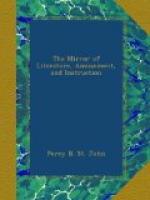(For the Mirror.)
This odd custom is now vice versa. The stang is of Saxon origin, and is practised in Lancashire, Cumberland, and Westmoreland, for the purpose of exposing a kind of gyneocracy, or, the wife wearing the galligaskins. When it is known (which it generally is) that a wife falls out with her spouse, and beats him right well, the people of the town or village procure a ladder, and instantly repair to his house, where one of the party is powdered with flour—face blacked—cocked hat placed upon his cranium—white sheet thrown over his shoulders—is seated astride the ladder, with his back where his face should be—they hoist him upon men’s shoulders—and in his hands he carries a long brush, tongs, and poker. A sort of mock proclamation is then made in doggerel verse at the door of all the alehouses in the parish, or wapentake, as follows:—
“It is neither for your sake nor
my sake
That I ride stang;
But it is for Nancy Thomson,
Who did her husband hang.
But if I hear tell that she doth rebel,
Or him to complain, with fife and drum
Then we will come,
And ride the stang again.
With a ran tan tang,
And a ran tan tan tang,”
&c.
The conclusion of this local custom is generally ended at the market cross, (if any,) or in the middle of the hamlet; after which, one of the posse goes round with a hat, begging the contributions of those present; they then regale themselves at some of the village ale-shops, out of the proceeds of the day’s merriment.—Brand and Strutt mention this custom; as does Brigg, in his “Westmoreland as it was.”
J.W.
Preston, Lancashire.
* * * * *
THE SKETCH-BOOK.
[The following characteristic sketch having been presented to me by a friend as, to the best of his knowledge, an unpublished morceau by the celebrated Ettrick Shepherd, I have by his permission the pleasure of adding it, to the many interesting cabinet pictures, already preserved in this department of the MIRROR.—M.L.B.]
ROVER.
Rover is now about six years old. He was born half a year before our eldest girl; and is accordingly looked upon as a kind of elder brother by the children. He is a small, beautiful liver-coloured spaniel, but not one of your goggle-eyed Blenheim breed. He is none of your lap dogs. No, Rover has a soul above that. You may make him your friend, but he scorns to be a pet. No one can see him without admiring him, and no one can know him without loving him. He is as regularly inquired after as any other member of the family; for who that has ever known Rover can forget him? He has an instinctive perception of his master’s friends, to whom he metes out his caresses in the proportion of their attachment




